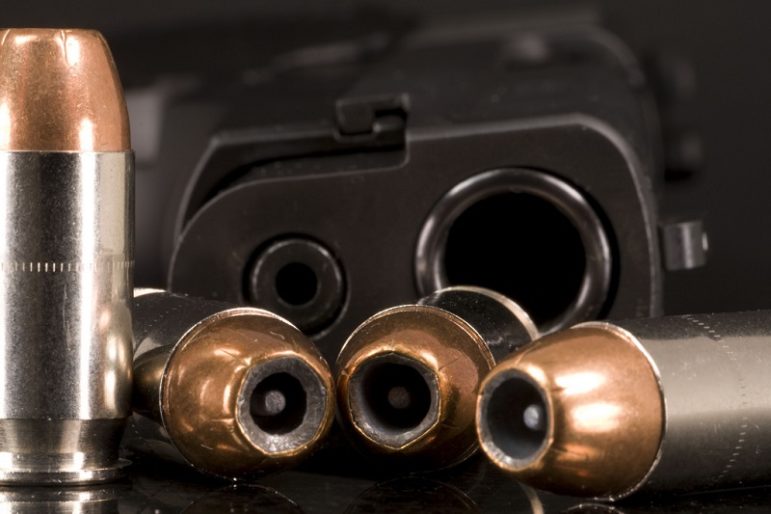
February 17, 2017; NPR, “The Two-Way”
The First Amendment is often cited in defense of unpopular expression and ideas. The Second Amendment, protecting the rights of individual citizens to bear arms, is a conceptual crucible from which deep, fundamentally existential societal conflicts are forged. However, rarely have the powers of the pen and the pistol been pitted against each other in the courts—until 2011, when the state of Florida enacted the Privacy of Firearms Owners Act, which was immediately challenged in federal court in a case popularly known as “Docs v. Glocks.”
The 11th U.S. Circuit Court of Appeals on Friday voted 10-1 that key provisions of Florida’s gun rights law, prohibiting Florida doctors from discussing firearms with their patients, violate the First Amendment rights of physicians. The law was never applied, as a Federal District Court in 2012 quickly struck down the law at the pleading of the plaintiffs: three individual doctors and the Florida Pediatric Society, the Florida Academy of Family Physicians, and the Brady Campaign to Prevent Gun Violence.
The Privacy of Firearms Owners Act was aimed, according to the 11th Circuit, in such common cases as pediatricians asking parents about firearms in the home. The restrictive statute provided penalties for violations, including fines up to $10,000 and potential loss of a medical license, unless a doctor was acting in good faith belief that guns in the home were a potential medical harm. The convincing majority overruled the Court’s three-judge decision in 2014 upholding the law, in doing so holding that state of Florida has no authority to tread on the right of free speech without a very good reason: “Florida does not have carte blanche to restrict the speech of doctors and medical professionals on a certain subject without satisfying the demands of heightened scrutiny.”
Heightened scrutiny is an almost insuperable evidentiary threshold reserved for the intrusion on fundamental, constitutional rights, elevated far above the principle of “preponderance of the evidence,” a measure of simple majority—or essentially 50.1% or higher—reserved for consideration of other non-constitutional rights such as some statutory or common law protections. The Court clearly spelled out what was worth defending in the doctor-patient relationship—free speech as a means of protecting patients and their families:
As part of their medical practices, some doctors routinely ask patients about various potential health and safety risks, including household chemicals, drugs, alcohol, tobacco, swimming pools, and firearms. A number of leading medical organizations, and some of their members, believe that unsecured firearms ‘in the home increase risks of injury, especially for minors and those suffering from depression or dementia.
As the Atlanta Journal-Constitution reported in 2016 at the time of the argument before the full panel of the 11th Circuit, the NRA wrote its members in support of the law, stating that doctors claiming to do their job were throwing a smokescreen to cover illicit attempts at gun control:
Physicians interrogating and lecturing parents and children about guns is not about gun safety. It is a political agenda to ban guns. Parents do not take their children to physicians for a political lecture against the ownership of firearms; they go there for medical care.
Sign up for our free newsletters
Subscribe to NPQ's newsletters to have our top stories delivered directly to your inbox.
By signing up, you agree to our privacy policy and terms of use, and to receive messages from NPQ and our partners.
This argument carried no weight with the deciding judges. Judge William Pryor, a serious contender for the Supreme Court before President Trump nominated Neil Gorsuch, voted with the majority and wrote a separate concurring opinion to emphasize what is at stake in ordering the priority and interrelationship of Constitutional Rights:
The First Amendment is a counter-majoritarian bulwark against tyranny. […] The promise of free speech is that even when one holds an unpopular point of view, the state cannot stifle it. The price Americans pay for this freedom is that the rule remains unchanged regardless of who is in the majority.
He continued, warning against a slippery slope of speech suppression inherent in upholding Florida’s statute:
Without the protection of free speech, the government might seek to censor political speech by doctors. The state might prevent doctors from encouraging their patients to vote in favor of universal health care or prohibit a physician from criticizing the Affordable Care Act. Some might argue that such topics are irrelevant to a particular patient’s immediate medical needs, but the First Amendment ensures that doctors cannot be threatened with state punishment for speech even if it goes beyond diagnosis and treatment.
With nothing to lose, there is a good chance Florida Governor Rick Scott will order a challenge to the ruling at the U.S. Supreme Court, and Republican Attorney General Pamela Bondi—whose name should ring a bell—would likely have no personal quandary complying with such request. The challenge will also serve as an appeal to the conservative Republican base in Florida and nationwide.
Whether the Supreme Court grants certiorari is another matter altogether. The 11th Circuit has laid bare the clear constitutional violation without qualifying its holding with any shade of doubt, and the Supreme Court likely wouldn’t see this as a model case to reinforce or underscore the trending broad interpretation of the Second Amendment in favor of gun owners. It simply is not a credible argument, as the NRA opined, that doctors can force gun owners to self-impose any denial of gun ownership rights; counseling patients does not in any manner usurp their free will.
Further, rather than expose the Court’s impotent and moribund deadlock with the current eight justices by taking on this case (assuming the application for certiorari is considered before Gorsuch or any subsequent nominee is approved by the Senate), which would only uphold the 11th Circuit ruling, the Supreme Court could do the same thing by not accepting the case. They would consider carefully, as the lower court opines, that upholding the Privacy of Firearms Owners Act would open the floodgates to shutting down unpopular or oppositional speech.
This is the Court of cases like Citizens United v. FEC, which struck down some key limits on campaign financing in large part based on the freedom of political speech provided by the First Amendment. Even the conservative wing of the Court, not a stalwart friend of gun control, would consonantly be compelled to support the hard-fought-for protections of medical speech under a strong First Amendment.—Louis Altman















